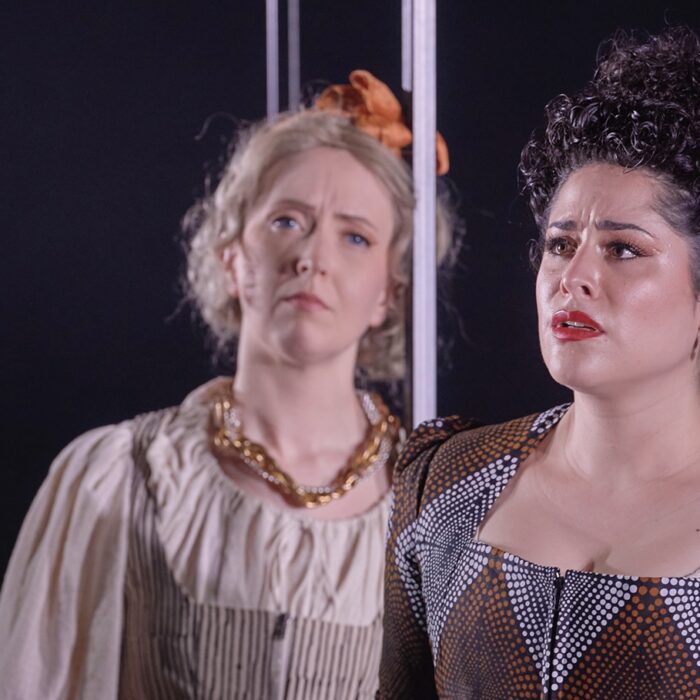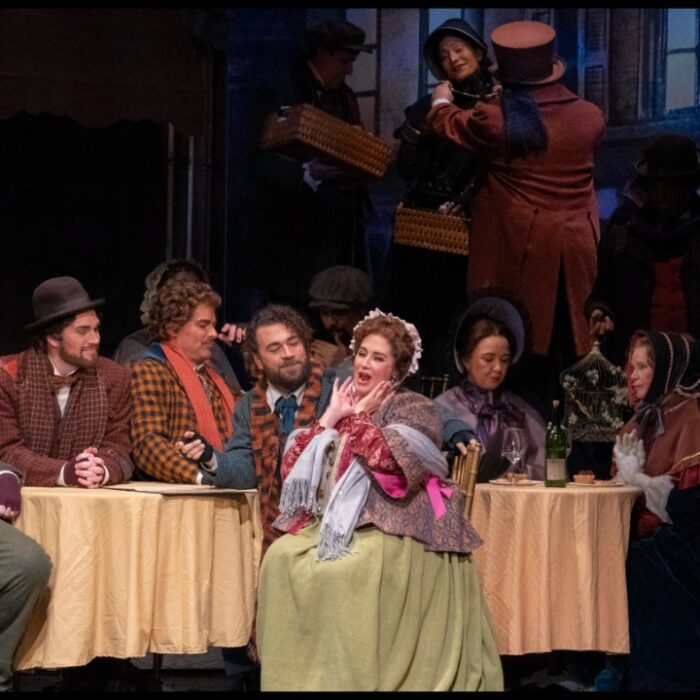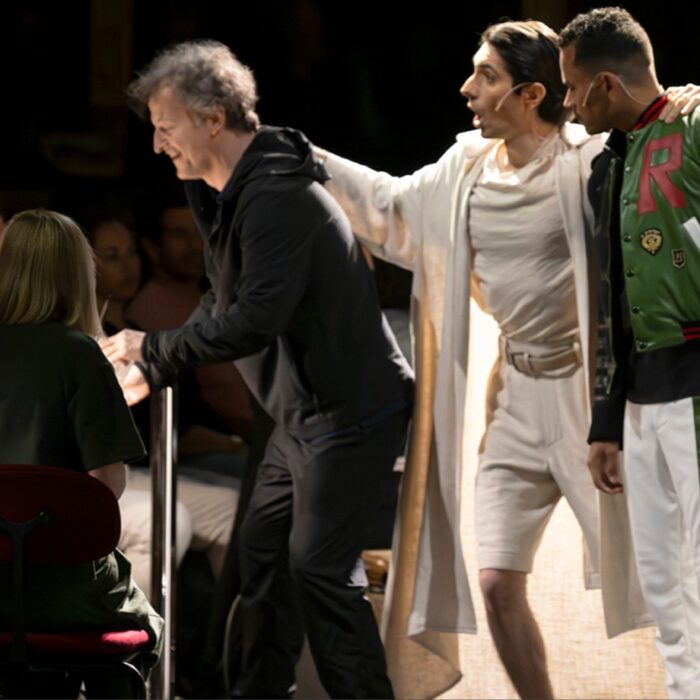
Tanglewood Festival 2018 – La Bohème
Andris Nelsons, Kristine Opolais, Jonathan Tetelman Lead Puccini’s Magical Opera Under Thundering Skies
By Matt CostelloSome reading this review — perhaps many — have never been to the Tanglewood Music Festival in Lenox, Massachusetts.
Much more than the summer home of the Boston Symphony Orchestra, Tanglewood is a magical place; so many thrilling, historical performances and moments have taken place here. And I’ve been lucky to attend many of those performances, such as Seiji Ozawa’s triumphal championing of Berlioz, making use of the expanse and stunning acoustics of the music “shed,” the Eliel Saarinen designed theater.
One especially memorable moment occurred a mere 30 years ago, when the festival celebrated Leonard Bernstein’s 70thbirthday. On that night, Lenny — whose career is so woven into the performances and his teaching at Tanglewood — sat on stage as a host of celebrities and singers performed his works in tribute. It was, as it would turn out, close to the end for Lenny. But that evening, it was a party, a full-blown celebration.
Now, this year, the festival celebrates his 100thbirthday and throughout the summer season, the concerts will highlight the works written by and performed by Lenny. It is – if you peruse the concerts scheduled – a season to dream of “Candide,” “Trouble in Tahiti,” the Academy Award-winning film of “West Side Story,” with the Boston Symphony playing.
And a weekend finale that, with a quartet of conductors and vocal and instrumental stars joining an orchestra expanded to include members from the New York Philharmonic Orchestra, Vienna Philharmonic, and Israel Philharmonic Orchestra, will be – I’m sure – unbelievably memorable.
That is still to come, on the last weekend of the season. But the subject of this review, is this past Saturday’s “La Bohème,” which was presented in a semi-staged version.
Bohemian Rhapsody
The program notes that “La Bohème” had been scheduled for this celebration summer since Bernstein famously did a “Bohème” live recording (in-concert as well!), in 1988, with the orchestra and chorus of the Academia di Santa Cecilia in Rome with a cast that included Jerry Hadley, Thomas Hampson, and Barbara Daniels. It also featured someone who sang in this same performance – the legendary bass, Paul Plishka.
Having seen the Met Opera put Paris on its stage, to create a bustling and oh-so-Parisian Café Momus, could the Puccini classic work its magic as a semi-staged performance?
I’m happy to say that, rather surprisingly, the answer is a vigorous “yes.” This “La Bohème” was powerful, moving and filled with moments of heart, comedy and vocal fireworks that had the crowd on its feet at the end.
Thrilling Leads
Looking at the singers, there was one notable surprise, namely, the tenor performing Rodolfo was a replacement, “on short notice,” we were advised. The originally scheduled Rodolfo, Piotr Beczala, had withdrawn in order to replace Roberto Alagna, who had himself — weeks ago — withdrawn from this year’s Bayreuth “Lohengrin.” One read such an announcement, on the first page of the concert’s program, with some trepidation.
The replacement, Jonathan Tetelman, was unknown to me, and unknown – I imagine – to most, if not all, the audience.
And for me, at least, for a “La Bohème” to really soar it needs a solid Rodolfo. Not just any Rodolfo, but one who can hold the stage with a (hopefully ) equally powerful Mimì.
And as for the Mimì, the audience had no such concerns. Kristine Opolais is a major soprano, in much demand on the international stage. Her voice, both powerful and plaintive…assured in the climactic moments, and touching for those times of gentle confession as the Puccini score inevitably blooms to some of opera’s most thrilling moments. And Opolais did not disappoint, many times providing the thrills that only a great Mimì can do.
But many in that audience had to be carefully scrutinizing, moment to moment, how Tetelman was doing, debuting at Tanglewood in this powerful yet demanding plum of a role.
Initially, at the opening — since I was, to be honest, scrutinizing as well — he seemed to be merely part of a tightly knit ensemble of artists. There seemed to be no hint, in those first raucous and funny scenes, that — rest assured — we did indeed have our Rodolfo. He certainly looked the part, and also carried off the humor with an ease that made this one of the more humorous “Bohème’s” I have attended.
Then, of course, left alone by his fellow Bohemians, to encounter his Mimì, their doomed and passionate love, again like many, I waited. And then, what had been his paced, measured singing began to grow. The drama was totally in the voice. And after his first solo, a traditional point where there is a pause for an ovation, the won-over audience clapped and bravo-ed. I was relieved to be sure, but more than that, thrilled. I won’t go so far as to say a “Star is Born.” But it certainly had the feel of exactly that kind of moment as he held his position with Opolais, having finished singing about his struggling life as a poet, that moment a precious one in opera.
This was a great Tanglewood debut for Tetelman. He’s only 28 and already has such assurance and clarity. We can only hope to see much more of him.
And I imagine Opolais, with her experience, must have also been relieved. The doomed dance of Rodolfo and Mimì requires two powerful singers who can take the audience to the heights with their duets. She, like her character, had an apt partner for what would become a memorable performance.
Strong Support
Not sure one can call the roles of Marcello, the equally struggling painter, and Musetta as merely “supporting.” Their love, not quite as doomed, serves as a match to the more troubling Rodolfo and Mimì.
Susanna Philips’ well-honed Musetta was beautiful, sexy, and funny. She glistened and owned the stage vocally and physically as only a perfect Musetta can. And Franco Vassallo’s Marcello was the perfect friend to Rodolfo. Teasing, supportive and concerned. He had a rich baritone that had me thinking that this night, under the threatening skies in the mountains (more about that later), this was a performance with an excess of riches.
The remaining Bohemians, Elliot Madore’s stolid and steady Schaunard and Luca Pisaroni’s Colline, were all perfect.
And to make this even more perfect – the great and legendary Paul Plishka, a Met staple since the mid-1980s, long retired and yet coaxed out of said retirement…played Alcindoro and Benoit with a stage presence (and yes, still that great bass voice) that only a master can bring. Long may he continue to do so.
And what of the great Boston Symphony Orchestra under the baton of its director, Andris Nelsons? And the use of the Tanglewood Festival Chorus, normally standing in rows, when their services were called for? Always on the risers, librettos in hand.
Stormy Skies
When Opolais began “Mi chiamano Mimi,” the skies, which had been threatening, decided to reward her beautiful singing, this moment of operatic confession, with a deep rumble of thunder.
And if that wasn’t enough, more rumbles followed, until a full-on downpour hit the beautiful Tanglewood grounds and the shed itself. Could, the constant tapping of the rain hitting the shed roof be distracting? Maybe to some (and I do get annoyed at distractions, by the way), but not for me.
The magic of nature putting on a noisy show as Opolais soared, and then Tetelman, did as well was truly riveting and unforgettable.
And the orchestra? Imagine this warhorse of an opera, this staple, given a nuanced, powerful performance as only one of the world’s great orchestras can deliver. Details emerged from music one knew so well, aficionados probably surprised and intrigued, almost as if hearing something new and fresh. Nelsons, who I have heard conduct only a few times, was totally at home with this verismo masterpiece. And the chorus? The staging?
The staging was, as you might in imagine, limited. But it gained a liveliness and intimacy that raised this performance to one of the absolutely best “Bohèmes” I have seen. If you caught Baz Luhrman’s Broadway “La Bohème”, with stage people making the fireplace in Act one flicker, right in front of the audience, you get a feeling of a similar inventiveness in the direction here.
The chorus were costumed as they portrayed the meddlers, urchins, gentlemen and ladies of the Latin Quarter. They were thrilling to watch, always engaged. When the marching band appeared, the trumpets marched from the back, right through the theater. Both the sides and back of the shed were used to place the chorus at different points, and it was so very effective.
Daniel Rigazzi is the accredited director for making this stage magic work. His direction of the principals in those very active scenes in Act one and four, was precise, funny and moving. A veteran of the Met, that experience shows. But it must have been an interesting challenge for him to tackle this particular opera in the supposed-limitations of semi-staged production. It was, for me, a theatrical style that could call to mind the work of Peter Brook, where less can be so much more. Add to that no intermission between Acts one and two, and Acts three and four, and you have a propulsive tragedy.
It was a sleeker “La Bohème,” and in some ways, despite the streets of Paris not being there in all their vividness, so much more emotionally gripping.
Quiet a night, as they say. One for the books, or at least…my memories.
And if there are any lessons to be drawn from this it’s that…more such operatic experiment in the great Tanglewood Shed should be attempted. That, and a deep appreciation that Tanglewood brought Opolais’s Mimì, Vassallo’s Marcello, Phillips Musetta and all the others to the Berkshire mountains.
As to Jonathan Tetelman’s Rodolfo? Well, I’m not too worried that we’ll all be hearing a lot more about him, and soon.


